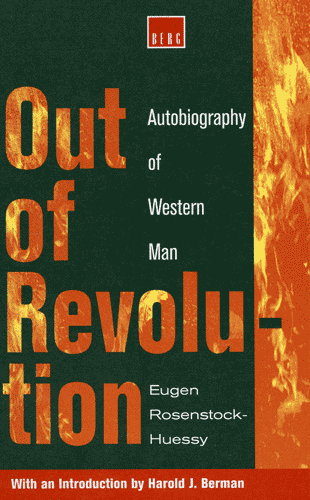Out of Revolution
Autobiography of Western Man

In his introduction, Harold Berman writes:
That this book written six decades ago is without any question an extraordinary book, a remarkable book, a fascinating book, has not saved it from relative obscurity. It is directed against conventional historiography, and for the most part the conventional historians have either ignored it or denounced it. … I have no doubt that one day perhaps soon the academic historians will discover that Rosenstock-Huessy was also one of the great pioneers in a new and significant interpretation of the history of mankind.
Out of Revolution is history in the best sense of the word. Although it embodies original scholarship of the highest professional quality, it is written primarily for the amateur, the person of general education, who wants to know where we came from and whither we are headed. But it is also a theory of history: how history should be understood, how historians should write about it.
The historian Page Smith considered this Rosenstock-Huessy’s greatest work in English. In his 1964 book The Historian and History, he wrote:
Eugen Rosenstock-Huessy was one of those Europeans who at the end of World War I decided that the war had made familiar categories of thought obsolete. He undertook, in a series of books and articles, to illuminate the relation between history and the human experience and to explicate the progress of man through history toward a common future…
The revolutions of mankind, Huessy wrote, “create new time-spans for our life on earth. They give man’s soul a new relation between present, past, and future; and by doing so they give us time to start our life on earth all over again, with a new rhythm and a new faith.” This is the framework for Huessy’s history of Europe and it may safely be said to be the first historical work written under the new dispensation. As such, it is of profound significance for contemporary history, but its very uniqueness has left it high and dry on the banks of academe. Nobody knew what to make of it because nobody had seen anything like it before.
Reinhold Niebuhr said of Out of Revolution:
Really a remarkable book, full of profound insights into the meaning of modern European history. I have not read a book in a long time which is so imaginative in relating the various economic, religious and political forces at play in modern history, to each other. Ordinary historical interpretations are pale and insipid in comparison with it.
Berg Publishers, 1993. Hardbound and paperback, 795 pages.
